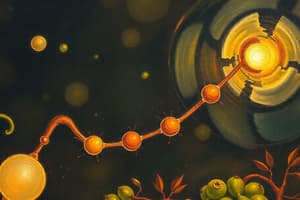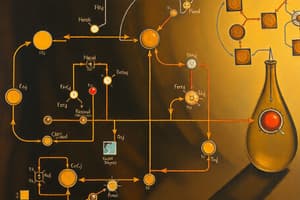Podcast
Questions and Answers
Which pathway is considered a pure anabolic pathway?
Which pathway is considered a pure anabolic pathway?
- Glycogenolysis
- Glycolysis
- Krebs cycle
- Glycogenesis (correct)
What is the total ATP yield from the complete oxidation of one molecule of glucose aerobically?
What is the total ATP yield from the complete oxidation of one molecule of glucose aerobically?
- 6-8 ATP
- 36-38 ATP (correct)
- 12 ATP
- 2 ATP
Which of the following coenzymes is required for the HMP shunt?
Which of the following coenzymes is required for the HMP shunt?
- NADP (correct)
- Coenzyme A
- NAD
- FAD
In which pathway is substrate level phosphorylation NOT utilized?
In which pathway is substrate level phosphorylation NOT utilized?
What is the role of glucose-6-phosphatase in glycogenolysis in the liver?
What is the role of glucose-6-phosphatase in glycogenolysis in the liver?
What is the function of glycogen phosphorylase?
What is the function of glycogen phosphorylase?
Which substrate conversion is necessary for synthesizing glucose from propionol?
Which substrate conversion is necessary for synthesizing glucose from propionol?
What is the effect of fructose 2, 6-bisphosphate on metabolic pathways?
What is the effect of fructose 2, 6-bisphosphate on metabolic pathways?
What characterizes Fanconi syndrome?
What characterizes Fanconi syndrome?
What is the normal renal threshold for glucose?
What is the normal renal threshold for glucose?
Flashcards
Anabolic Pathway
Anabolic Pathway
A pathway that builds complex molecules from simpler ones.
Catabolic Pathway
Catabolic Pathway
A pathway that breaks down complex molecules into simpler ones, releasing energy.
Amphibolic Pathway
Amphibolic Pathway
A pathway that can function both as an anabolic or catabolic pathway, depending on cellular need; reversible reactions.
Glycolysis
Glycolysis
Signup and view all the flashcards
Aerobic Glycolysis
Aerobic Glycolysis
Signup and view all the flashcards
Anaerobic Glycolysis
Anaerobic Glycolysis
Signup and view all the flashcards
Krebs Cycle
Krebs Cycle
Signup and view all the flashcards
Substrate-Level Phosphorylation
Substrate-Level Phosphorylation
Signup and view all the flashcards
Coenzyme
Coenzyme
Signup and view all the flashcards
Glycogenesis
Glycogenesis
Signup and view all the flashcards
Glycogenolysis
Glycogenolysis
Signup and view all the flashcards
Gluconeogenesis
Gluconeogenesis
Signup and view all the flashcards
HMP Shunt
HMP Shunt
Signup and view all the flashcards
Uronic Acid Pathway
Uronic Acid Pathway
Signup and view all the flashcards
Glucose-6-phosphatase
Glucose-6-phosphatase
Signup and view all the flashcards
Mitochondria
Mitochondria
Signup and view all the flashcards
Glycogen Phosphorylase Action
Glycogen Phosphorylase Action
Signup and view all the flashcards
Glycerol to Glucose Synthesis
Glycerol to Glucose Synthesis
Signup and view all the flashcards
Propionyl-CoA to Glucose Synthesis
Propionyl-CoA to Glucose Synthesis
Signup and view all the flashcards
Fructose-2,6-bisphosphate Function
Fructose-2,6-bisphosphate Function
Signup and view all the flashcards
Fanconi Syndrome
Fanconi Syndrome
Signup and view all the flashcards
Pyruvate to Acetyl-CoA
Pyruvate to Acetyl-CoA
Signup and view all the flashcards
RBC Glycolysis
RBC Glycolysis
Signup and view all the flashcards
Normal Fasting Blood Glucose
Normal Fasting Blood Glucose
Signup and view all the flashcards
Renal Threshold
Renal Threshold
Signup and view all the flashcards
Glucokinase & Hexokinase Action
Glucokinase & Hexokinase Action
Signup and view all the flashcards
Fructokinase Action
Fructokinase Action
Signup and view all the flashcards
Hexokinase Action on Fructose
Hexokinase Action on Fructose
Signup and view all the flashcards
Galactokinase Action
Galactokinase Action
Signup and view all the flashcards
Hexokinase Action on Galactose
Hexokinase Action on Galactose
Signup and view all the flashcards
Study Notes
Carbohydrate Metabolism Revision
- Anabolic Pathway: Glycogenesis, Gluconeogenesis
- Catabolic Pathway: Glycolysis, Oxidative Decarboxylation, Krebs Cycle, HMP shunt, Uronic acid pathway, Glycogenolysis
- Amphibolic Pathway: Krebs cycle
- Aerobic Glycolysis: Glucose yields 36-38 ATP
- Anaerobic Glycolysis: Glucose yields 2 ATP
- Oxidative Decarboxylation of Pyruvate: 6 ATP
- Acetyl CoA Oxidation in Krebs Cycle: 12 ATP
- Substrate-Level Phosphorylation (Glycolysis): Phosphoglycerate kinase, Pyruvate kinase
- Substrate-Level Phosphorylation (Krebs Cycle): Succinate thiokinase
- Coenzymes:
- HMP shunt: NADP
- Glyceraldehyde-3-phosphate dehydrogenase: NAD
- Succinate dehydrogenase: FAD
- Uronic Acid Pathway: Important for Glucuronic acid production (detoxification), UDP-glucuronic acid synthesis (vitamin C in animals)
- HMP Shunt: Produces NADPH+H and ribose-5-phosphate
- Key Enzymes (Glycolysis): Hexokinase, Glucokinase, Phosphofructokinase-1, Pyruvate Kinase
- Key Enzymes (Krebs Cycle): Citrate synthase, Isocitrate synthase, α-ketoglutarate dehydrogenase
- Key Enzymes (HMP Shunt): Glucose-6-phosphate dehydrogenase
- Key Enzymes (Glycogenesis): Glycogen synthase
- Key Enzymes (Glycogenolysis): Glycogen phosphorylase
- Key Enzymes (Gluconeogenesis): Pyruvate carboxylase, Phosphoenolpyruvate carboxykinase, Fructose-1,6-bisphosphatase, Glucose-6-phosphatase
- Glycogen Synthesis Requirements: Glycogen synthase, UDP-glucose, Branching enzyme, Glycogen primer
- Glycogen Breakdown Requirements: Glycogen phosphorylase, Inorganic phosphate, Glucan transferase, Debranching enzyme
- Glycogenolysis in Liver: Produces free glucose due to glucose-6-phosphatase
- Glycogenolysis in Muscle: Cannot produce free glucose (lacks glucose-6-phosphatase)
- Cytoplasmic Cycles: Glycolysis, Oxidative decarboxylation, HMP shunt, Uronic acid pathway, Glycogenesis, Glycogenolysis
- Mitochondrial Cycle: Krebs cycle
- Gluconeogenesis: Occurs in both cytoplasm and mitochondria
- Glycerol to Glucose: Converted to dihydroxyacetone phosphate for glucose synthesis
- Propionyl-CoA to Glucose: Converted to succinyl-CoA
- Fructose-2,6-bisphosphate: Formed from fructose-6-phosphate. Stimulates glycolysis, inhibits gluconeogenesis
- Fanconi Syndrome: Characterized by decreased reabsorption of glucose, amino acids, phosphate leading to glucosuria, aminoaciduria, phosphaturia
- Pyruvate to Acetyl-CoA: Catalyzed by pyruvate dehydrogenase complex (5 coenzymes: NAD, FAD, CoASH, TPP, Lipoic acid)
- α-Ketoglutarate to Succinyl-CoA: Catalyzed by α-ketoglutarate dehydrogenase complex (5 coenzymes)
- RBC Glycolysis: Anaerobic, ends with lactate, produces 2 ATP, independent of insulin, produces 2,3-bisphosphoglycerate
- Blood Glucose Ranges: Normal fasting blood glucose (70-110 mg/dL), 2-hour postprandial (up to 140 mg/dL), Hypoglycemia (<60 mg/dL)
- Renal Threshold for Glucose: 180 mg/dL
- Hexokinase/Glucokinase on Glucose: Glucose-6-phosphate
- Fructokinase on Fructose: Fructose-1-phosphate
- Hexokinase on Fructose: Fructose-6-phosphate
- Galactokinase on Galactose: Galactose-1-phosphate
- Hexokinase on Galactose: Galactose-6-phosphate
Studying That Suits You
Use AI to generate personalized quizzes and flashcards to suit your learning preferences.




